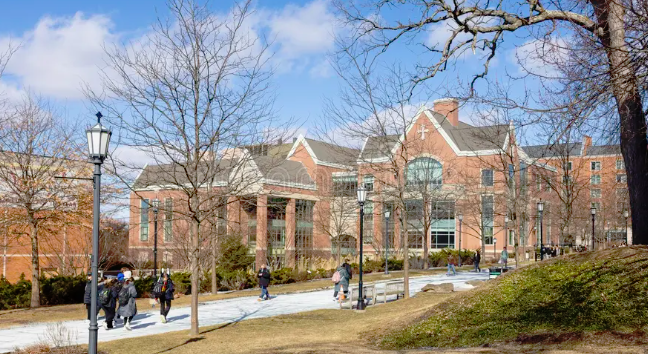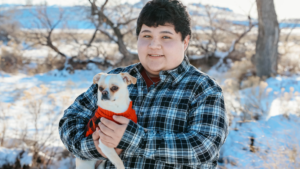This guest post is by Scot Larson a young man who attends University of Scranton. He is an advocate for the Spring 2025 Making a Difference Autism Scholarship via the nonprofit KFM Making a Difference started by me, Kerry Magro. I was nonverbal till 2.5 and diagnosed with autism at 4 and you can read more about my organization here.
Autistics on Autism the Next Chapter: Stories You Need to Hear About What Helped Them While Growing Up and Pursuing Their Dreams was released on Amazon on 3/25/25 and looks at the lives over 75 Autistic adults. 100% of the proceeds from this book will go back to supporting our nonprofits many initiatives, like this scholarship program. Check out the book here.
My life growing up with autism has certainly been an eventful one. I was born in 2004, a time when ASD, and neurodivergence more generally, was far less well understood than it is today. I hadn’t shown any symptoms of autism during my infancy. According to my mother, I had been developing at a rate similar to neurotypical people. I had begun to say my first words at one year old and had pretty typical eating habits. Then, around the winter of 2006-2007, when I was two, I fell very ill, most likely with pneumonia, and stayed in the hospital for an entire week. I recovered, but when I came home, my mom said, I was very different. I was much more selective with what I enjoyed eating and I wasn’t able to say anything. Until recently, I believed that these changes were due to whatever treatment I was given at the hospital. However, now that I know much more about condition, I now realize that this is an example of correlation not equaling causation. After showing these symptoms for a while, I was officially diagnosed with what we would now call Autism Spectrum Disorder in 2007. During those few years before kindergarten, I did make some significant progress. While my palette hadn’t expanded very much, I was able to speak when I was four years old and learned to read by the time I turned five, by which point I had entered kindergarten (my fifth birthday was a few weeks into the school year).
I was also potty trained in large part thanks to a young man named Brad, which meant that by the time I entered kindergarten, my mother didn’t have too many worried about me being at school. I started out going to general education classes and soon, it was clear that there were some problems. I was hyperactive and struggled in class more generally. After a few weeks in gen-ed classes, it was clear that I needed extra help. So, about a month into the school year, I switched to another school that had a special education class, which I was I was able to do far better in. I stayed in special education until the end of third grade. During that time, I continued to make progress in school subjects, especially in math.
Then, during my third-grade year, I spent part of the day in my special-ed class and the other part of the day in a gen-ed class. I had made enough progress that my teachers decided it was time to have me go through a process called mainstreaming. Simply put, if a child in a special education class did well enough, they would go through a transition period where they would attend a special-ed class for part of the day and a gen-ed class for another part of the day. This was done with the goal of eventually having them leave their special-ed classes and go to gen-ed classes full-time. From what I heard from talking to my academic coach, this process has largely fallen out of favor in the last decade or so (again, because autism and other forms of neurodiversity are better understood). I took gen-ed classes from fourth grade onward, while still having a resource teacher, who would sometimes take me and other students out of class to work separately.
This went on until halfway through seventh grade, when I moved to another city and the setup changed a bit. While I would still go with the resource teacher separately with some other kids, it was now for an entire period in the day separate from all my other classes rather than during them. During this time, I continued to progress in school subjects, managing to make the honor roll several times. When I got to high school, I continued to have a resource teacher, but as time went on, I met with them less and less. I met them occasionally during classes, but by senior year, I only met with them a few times a year. During my senior year of high school, I stopped meeting with my resource teacher altogether, as they decided I no longer needed to. A few months earlier, during the spring, I applied to the University of Scranton and got accepted with a scholarship. As of writing this, I am approaching the end of my third year and, at least when it comes to grades, have been excelling. Early on in my freshman year, I met my current academic coach, who I still meet with to discuss my classes and progress in class with. This is where I have been since, doing better than I ever have.
Kerry Magro, a professional speaker and best-selling author who is also on the autism spectrum started the nonprofit KFM Making a Difference in 2011 to help students with autism receive scholarship aid to pursue a post-secondary education. Help us continue to help students with autism go to college by making a tax-deductible donation to our nonprofit here.
Also, consider having Kerry, one of the only professionally accredited speakers on the spectrum in the country, speak at your next event by sending him an inquiry here. If you have a referral for someone who many want him to speak please reach out as well! Kerry speaks with schools, businesses, government agencies, colleges, nonprofit organizations, parent groups and other special events on topics ranging from employment, how to succeed in college with a learning disability, internal communication, living with autism, bullying prevention, social media best practices, innovation, presentation best practices and much more!














